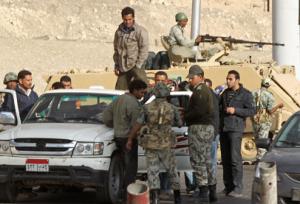Foreigners
 The soldiers had emptied our luggage onto the street and pulled apart the seats of our taxi. The driver was muttering angrily: “You don’t have to destroy my car.” It was four in the morning on Saturday and Cairo was under curfew, but we had decided to risk the checkpoints rather than wait at the airport until dawn.
The soldiers had emptied our luggage onto the street and pulled apart the seats of our taxi. The driver was muttering angrily: “You don’t have to destroy my car.” It was four in the morning on Saturday and Cairo was under curfew, but we had decided to risk the checkpoints rather than wait at the airport until dawn.
The youngest-looking man in the platoon methodically opened every zipper bag and wallet, sniffing my traveling companion’s shampoo and quizzically squeezing the earplugs that came in our Turkish Airlines complimentary traveler’s kit. This turned out to be only the second most invasive search of the night. Triumphantly, he pulled out our books.
Michael had The Girl Who Played With Fire and Eugene Rogan’s The Arabs. Foolishly, I had a brought a copy for friends of my book about Hezbollah, A Privilege to Die.
“What’s this book about?” a military intelligence officer asked me. That’s when he recognized me as the author from the jacket photo. Without a word, he ran to deliver the damning evidence to an even higher officer.
We waited for half an hour, shivering. The soldiers eyed me coldly. None of the usual smiles and chatter I’m accustomed to in Egypt.
A colonel pulled my friend aside.
“You want to know why these soldiers are so jumpy?” he said. “State television has been showing people that look just like your friend there, blaming them for the protests and violence.”
Egyptians have a well-earned reputation for hospitality, which has been a boon to the country’s bread-and-butter tourist trade. Many people seem to enjoy foreigners, normally.
There’s another strand of history that can be summoned though: that of inducing xenophobia in times of crisis. My Greek forebears did it time and again in the turbulent and pogrom-scarred years during which they forged a nationalistic identity after independence in 1821. Egypt has experienced its own periodic bouts of ethnic cleansing since 1919, and a spell of anti-foreigner rioting in the 1950s drove out most of Egypt’s historic Greek community.
This past week’s hysteria about foreigners – engineered by state television and by disingenuous statements from Egyptian leaders laying responsibility for popular unrest on foreign agents – taps into a deep strain of anxiety among Egyptians about their future.
It’s easier to blame foreigners than to confront internal divisions, and today’s rhetoric in Egypt has cast blame far and wide, but, playing on regional political realities, especially on Israelis, Americans, Qataris and Iranians.
In the pre-dawn chill on Saturday, I felt more foreign than I’ve felt at any point in my last eight years reporting in the Arab world. The friendly colonel at the military intelligence checkpoint hadn’t fallen prey to the idea, but his soldiers had.
Our books were returned and we were dispatched into the night.
The most invasive search came an hour later, and just a few hundred meters from our final destination in downtown Cairo. A wild-eyed plainclothes intelligence officer blanched when he saw my Greek passport. “A foreigner? Here? Now?” he screeched. “There is no possible good reason for you to be here.”
He dragged our bags into the storefront commandeered by a sleeping platoon of soldiers. “They have laptops!” he shouted. “Computers! Headphones! Cables!” He flung them every which way across the floor, and woke his bewildered commanding officer, who silently checked our equipment and papers, and cleared us to proceed.
“We must be careful,” he said. “The other day, you know what I found? A Turk with a flash drive. A flash drive! A single flash drive could destroy this entire nation.”
Released from his paranoid late-night fantasy, we finally went home, victims only of a passing, crazy moment. Let’s hope that for Egypt, this state-induced frenzy doesn’t last much longer.

